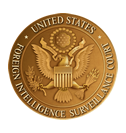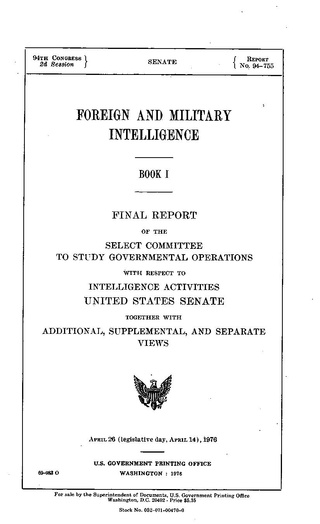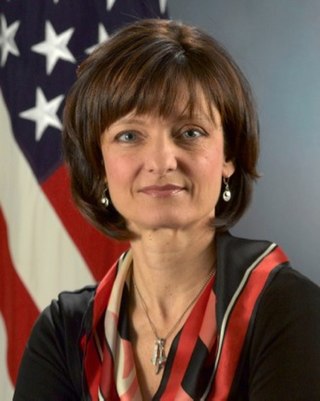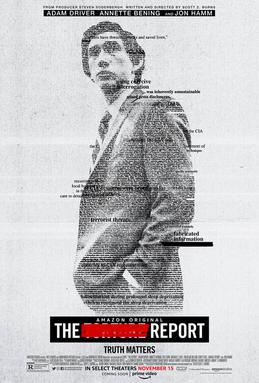
The United States Foreign Intelligence Surveillance Court (FISC), also called the FISA Court, is a U.S. federal court established under the Foreign Intelligence Surveillance Act of 1978 (FISA) to oversee requests for surveillance warrants against foreign spies inside the United States by federal law enforcement and intelligence agencies.

Joseph "Joe" Wright is an American businessman. From 1988 to 1989, he worked in the United States government as the Director of the Office of Management and Budget for president Ronald Reagan.

The Church Committee was a US Senate select committee in 1975 that investigated abuses by the Central Intelligence Agency (CIA), National Security Agency (NSA), Federal Bureau of Investigation (FBI), and the Internal Revenue Service (IRS). Chaired by Idaho Senator Frank Church (D-ID), the committee was part of a series of investigations into intelligence abuses in 1975, dubbed the "Year of Intelligence", including its House counterpart, the Pike Committee, and the presidential Rockefeller Commission. The committee's efforts led to the establishment of the permanent US Senate Select Committee on Intelligence.

OpenSecrets is a nonprofit organization based in Washington, D.C., that tracks data on campaign finance and lobbying. It was created from a merger of the Center for Responsive Politics (CRP) and the National Institute on Money in Politics (NIMP).
EDO Corporation was an American company which was acquired by ITT Corporation in 2007. EDO designed and manufactured products for defense, intelligence, and commercial markets, and provided related engineering and professional services. It employed 4,000 people worldwide and had revenues of $715 million in 2006. EDO's assets went to ITT Defense Electronics and Services. As of May 2015, these assets were now part of Harris Corporation, and since June 2019 L3Harris Technologies.
The Sunlight Foundation was an American 501(c)(3) nonpartisan, nonprofit organization that advocated for open government. The organization was founded in April 2006 with the goal of increasing transparency and accountability in the United States Congress, the executive branch, and in state and local governments. The foundation's primary focus was the role of money in politics. The organization sought to increase campaign finance regulations and disclosure requirements. The Sunlight Foundation ceased operations in September 2020.
K. A. (Kim) Taipale is an investor, legal scholar, and social theorist specializing in information, technology, and national security policy. He is a partner in Stilwell Holding, a private investment firm, and the former chairman of the executive committee of Kobra International Ltd. He is also the founder and executive director of the Stilwell Center for Advanced Studies in Science and Technology Policy, a private, nonpartisan research organization, and a director of the Stilwell Charitable Fund. He was previously an investment banker at Lazard Freres & Co. and a lawyer at Davis Polk & Wardwell.

Gary J. Shapiro is an acclaimed author, lobbyist, and the president and CEO of the Consumer Technology Association which represents over 1500 consumer technology companies and owns and produces the Consumer Electronics Show (CES). Shapiro is the author of the bestselling books Ninja Future: Secrets to Success in the New World of Innovation, Ninja Innovation: The Ten Killer Strategies of the World’s Most Successful Businesses and The Comeback: How Innovation Will Restore the American Dream. Through these books, media interviews, and opinion pieces in publications such as The Wall Street Journal, The New York Times and The Washington Post, Shapiro explains the economic importance of innovation. He is considered an “influencer" on LinkedIn, and is a speaker at conferences including DLD, Milken, The Next Web and SXSW.

Heather Miller Podesta is an American lawyer and lobbyist based in Washington, D.C. She is also a patron of contemporary art.

Trailblazer was a United States National Security Agency (NSA) program intended to develop a capability to analyze data carried on communications networks like the Internet. It was intended to track entities using communication methods such as cell phones and e-mail.

Thomas Andrews Drake is a former senior executive of the National Security Agency (NSA), a decorated United States Air Force and United States Navy veteran, and a whistleblower. In 2010, the government alleged that Drake mishandled documents, one of the few such Espionage Act cases in U.S. history. Drake's defenders claim that he was instead being persecuted for challenging the Trailblazer Project. He is the 2011 recipient of the Ridenhour Prize for Truth-Telling and co-recipient of the Sam Adams Associates for Integrity in Intelligence (SAAII) award.

Regina E. Dugan, is an American businesswoman, inventor, technology developer and government official. She was the first female director of the Defense Advanced Research Projects Agency (DARPA), where she served from July 2009 until March 2012.

PRISM is a code name for a program under which the United States National Security Agency (NSA) collects internet communications from various U.S. internet companies. The program is also known by the SIGAD US-984XN. PRISM collects stored internet communications based on demands made to internet companies such as Google LLC under Section 702 of the FISA Amendments Act of 2008 to turn over any data that match court-approved search terms. Among other things, the NSA can use these PRISM requests to target communications that were encrypted when they traveled across the internet backbone, to focus on stored data that telecommunication filtering systems discarded earlier, and to get data that is easier to handle.

The practice of mass surveillance in the United States dates back to wartime monitoring and censorship of international communications from, to, or which passed through the United States. After the First and Second World Wars, mass surveillance continued throughout the Cold War period, via programs such as the Black Chamber and Project SHAMROCK. The formation and growth of federal law-enforcement and intelligence agencies such as the FBI, CIA, and NSA institutionalized surveillance used to also silence political dissent, as evidenced by COINTELPRO projects which targeted various organizations and individuals. During the Civil Rights Movement era, many individuals put under surveillance orders were first labelled as integrationists, then deemed subversive, and sometimes suspected to be supportive of the communist model of the United States' rival at the time, the Soviet Union. Other targeted individuals and groups included Native American activists, African American and Chicano liberation movement activists, and anti-war protesters.

K. Stuart "Stu" Shea is an American business executive and leader and intelligence professional serving in a leadership capacity to public and private companies, as well as an advisor to government agencies, private equity investors, and academic institutions. Shea is chairman, president and chief executive officer of Peraton, a national security technology company. He is the former president and chief operating officer of Leidos, chief operating officer of Science Applications International Corporation (SAIC), and founder and emeritus chairman of the United States Geospatial Intelligence Foundation.

The FISA Improvements Act is a proposed act by Senator Dianne Feinstein, Chair of the Senate Intelligence Committee. Prompted by the disclosure of NSA surveillance by Edward Snowden, it would establish the surveillance program as legal, but impose some limitations on availability of the data. Opponents say the bill would codify warrantless access to many communications of American citizens for use by domestic law enforcement.
Lisa Graves is a progressive activist who is the executive director of True North Research and president of the board of the Center for Media and Democracy (CMD). She served as executive director for CMD from 2009 to 2017, when she left to co-found Documented Investigations. Graves also serves on the advisory board of U.S. Right to Know, and has previously advised UnKoch My Campus and the Bill of Rights Defense Fund.

Katherine Roberts Maher is a former chief executive officer and executive director of the Wikimedia Foundation.

The Democratic National Committee cyber attacks took place in 2015 and 2016, in which two groups of Russian computer hackers infiltrated the Democratic National Committee (DNC) computer network, leading to a data breach. Cybersecurity experts, as well as the U.S. government, determined that the cyberespionage was the work of Russian intelligence agencies.

The Report is a 2019 American historical / political drama film written and directed by Scott Z. Burns that stars Adam Driver, Annette Bening, Ted Levine, Michael C. Hall, Tim Blake Nelson, Corey Stoll, Maura Tierney, and Jon Hamm. The plot follows staffer Daniel Jones and the Senate Intelligence Committee as they investigate the Central Intelligence Agency's use of torture following the September 11th attacks. It covers more than a decade's worth of real-life political intrigue, exploring and compacting Jones's 6,700-page report. It is partly based on the article "Rorschach and Awe" by American journalist Katherine Eban; that publication was originally distributed by the magazine Vanity Fair in July 2007.














